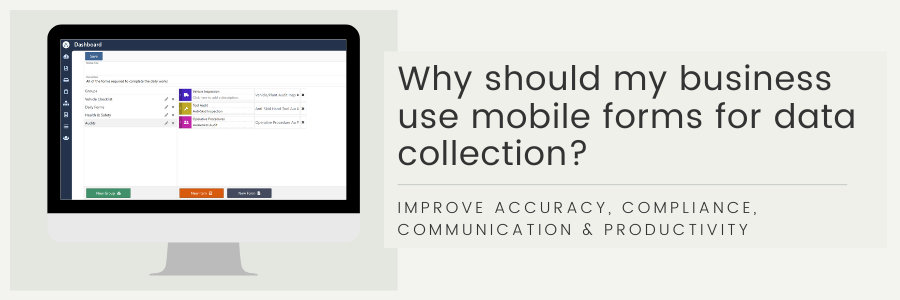
Why should my business use mobile forms for data collection?
21 December 2020
Mobile forms are an effective method of data collection. More and more businesses are deciding to leave paperwork behind to go digital.
There are many reasons why businesses are making the transition; maybe a company has an increasing amount of paperwork to stay compliant, or an organisation may want to reduce administrative duties by eliminating manual data entry.
In this blog, we will explore our top five reasons why your business should use mobile forms for digital data collection.
Complete mobile forms efficiently without compromising accuracy
The biggest pitfall of paper forms is the absence of validation. We’re sure you’re familiar with employees returning their paperwork incomplete with missing data and illegible handwriting. Adhering to strict job schedules can lead to operatives rushing their paperwork, leaving it until the end of the day, or not completing it all!
Mobile forms guarantee that your operatives quickly collect the right data with high levels of accuracy. Mandatory fields, dynamic responses, drop-down lists and pre-populated answers work together to collect detailed information, minimise mistakes and ensure the user populates every answer field before they can submit the form.
The results? A plethora of comprehensive, accurate data that empowers businesses to make data-driven decisions and improve operational efficiency.
Plus, mobile forms reduce turnaround times as operatives don’t have to return to the office to drop off paperwork, and your admin team no longer has to input the data into the computer system. Learn more about the speed advantages of mobile forms.
Add photographs, GPS locations and electronic signatures
The capabilities of mobile forms are far more complex than spreadsheets and paper processes. Mobile forms can collect rich data, such as photographs, GPS locations, timestamps and electronic signatures.
All of these features allow your business to gather much more detailed information compared to basic written answers on paper. Employees can use supporting evidence such as photos and time stamps to demonstrate they have completed the work in line with industry standards and regulations.
Improve communication with real-time updates
Effective communication is essential when you manage a mobile workforce. A huge advantage of mobile forms is that they are transferable between the mobile application and the back-office in real-time.
This helps a business in two ways. Firstly, any data that requires further processing can be analysed straight away, rather than waiting hours or sometimes days for the paperwork to arrive back at the office. It reduces administrative turnaround times and streamlines the overall workflow.
Faster turnaround times empowers better communication with clients. Job updates can be electronically sent to customers upon completion with higher levels of detail and accuracy.
Information collected through mobile forms empowers data-driven decisions
We’re in a time of economic uncertainty, and businesses must innovate and streamline their operational processes to stay ahead of the competition. A recent YouGov survey states that 80% of business leaders from data-driven organisations feel as though they have had a ‘critical advantage’ over businesses that don’t use data to make decisions throughout the COVID-19 pandemic.
Thanks to software and technology, data is simple to collect and much easier to access. Mobile forms can gather large quantities of rich information that you can export for reporting. Analysing data in the right way will allow you to find out anything you want to know. For example, ‘how many times did a truck get driven during August?’ or ‘how long does it take staff members to complete a certain job type?’. There is no limit to the knowledge you can gain from data analysis!
Data-driven decisions allow stakeholders to make informed, more accurate choices. Strengths and weaknesses within the business are identifiable through data, and decision-makers can adapt operational processes to streamline workflows. Utilising data helps to mitigate risk and avoids potential errors that are caused by a lack of insights.
Prioritising data in your decision-making leads to better choices and more success.
Mobile forms help to reduce costs
Of course, mobile forms have an associated cost, but after implementation, there are significant savings to be made. Here’s how:
- Fewer trips to the office mean operatives will drive fewer miles and therefore spend less money on petrol and other vehicle-related costs.
- There’s also significant savings from paper processes such as cutting down on paper, and the reduction in printing means less ink and toner are required.
- Admin tasks are less time-consuming, so the admin team doesn’t need to expand to manage bigger workloads which saves money on salaries.
Mobile Forms by Triangle
Formulate is our mobile forms solution. It’s a tailorable, integratable software system that captures data quickly and accurately while saving time and boosting productivity.
Learn more about mobile forms by Triangle or contact us at sales@trianglesoftware.co.uk for a friendly chat.